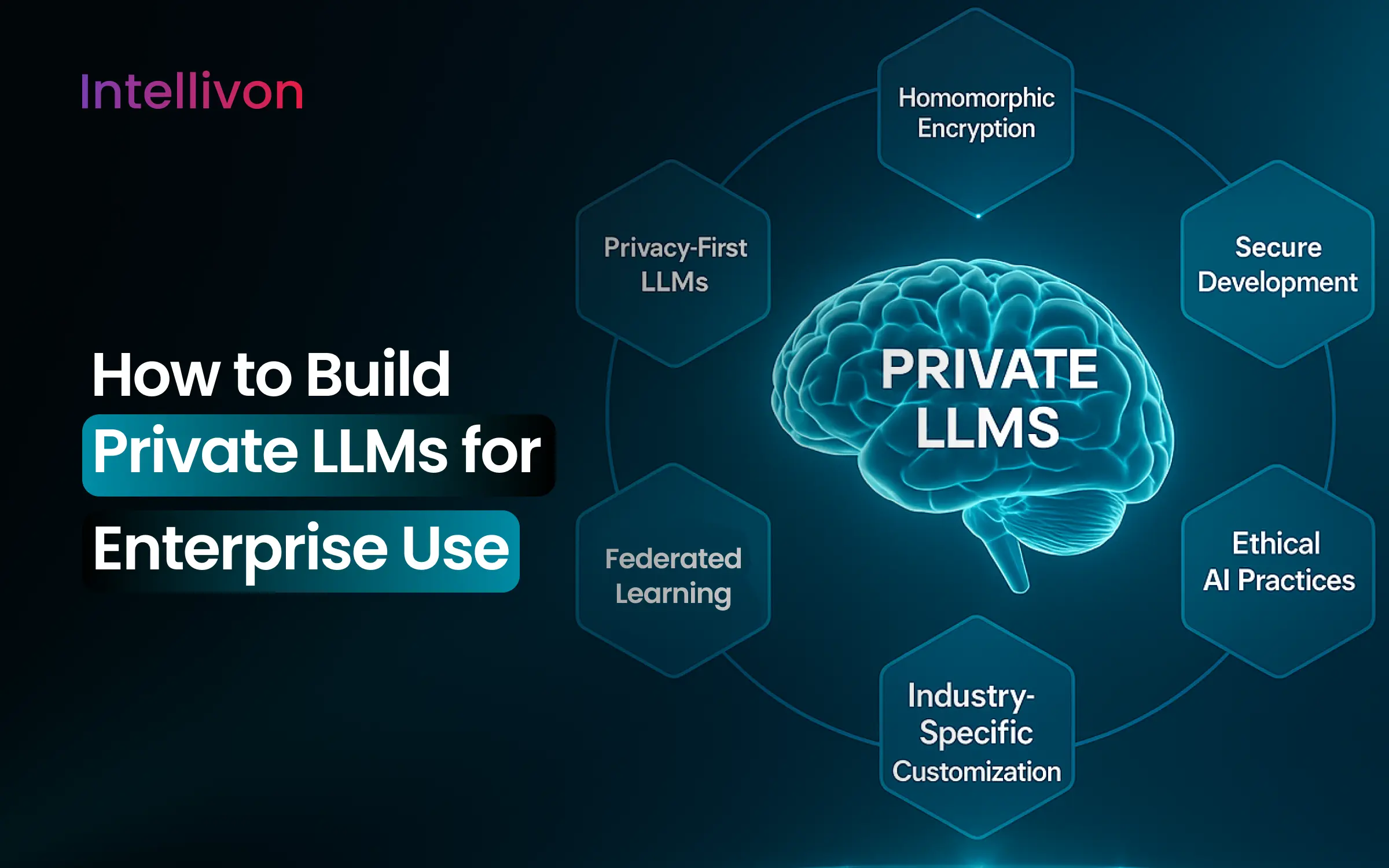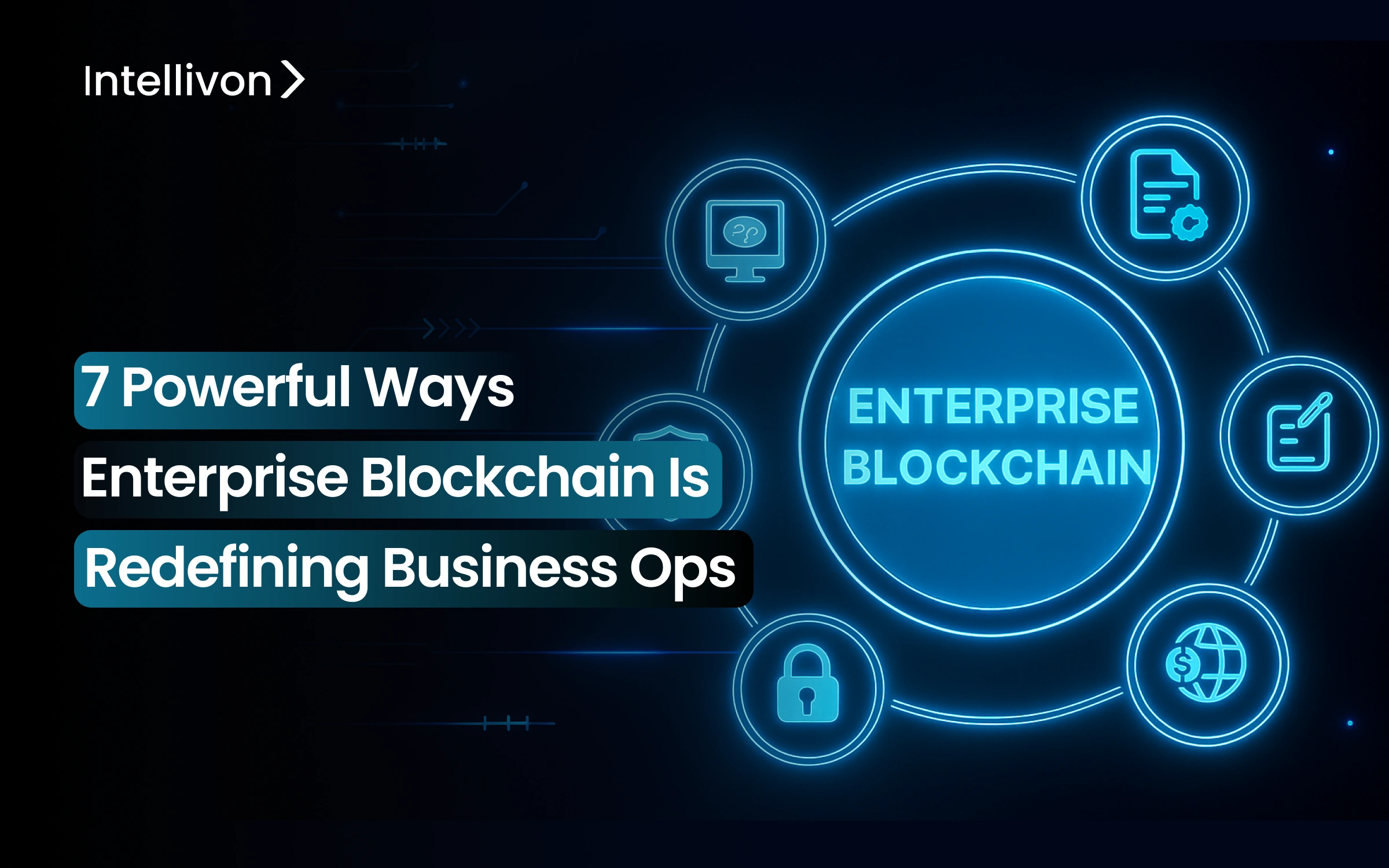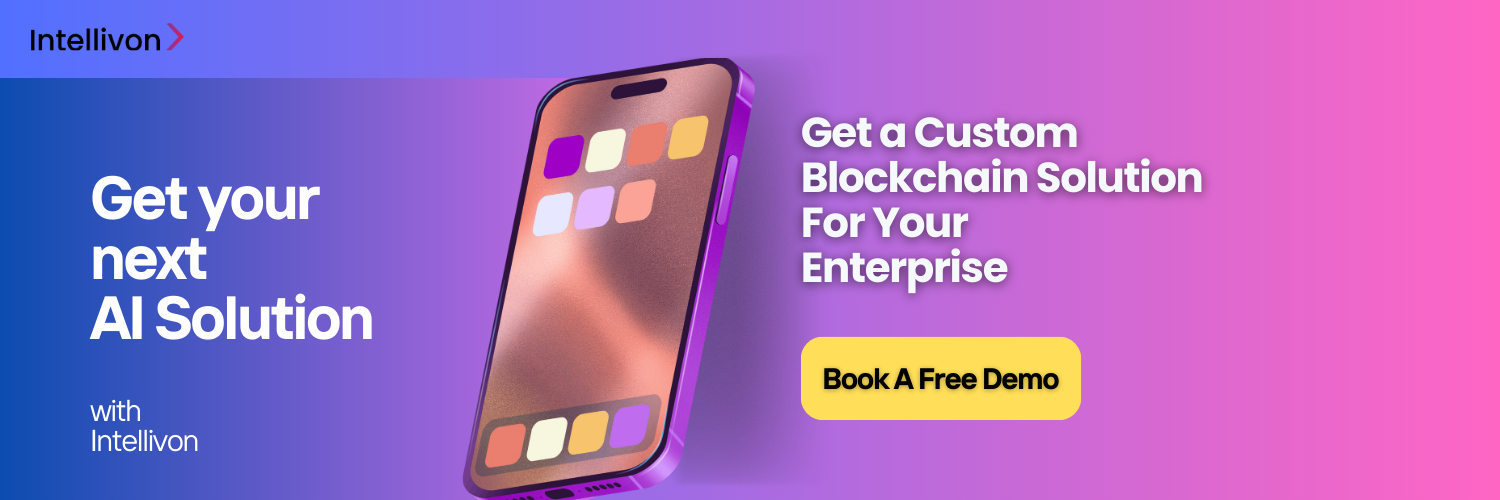Even though more companies are adopting blockchain, many still do not realize its full potential. The real value of blockchain lies in its ability to change essential business operations by providing better transparency, security, and efficiency. Enterprise blockchain offers a reliable base for effective operations. Its unchangeable nature makes sure that data is securely recorded and cannot be altered, giving businesses more confidence in their transactions and records.
In areas like supply chain and finance, blockchain enables real-time tracking, secure data sharing, and better teamwork among all involved parties. This leads to a smoother and more efficient business environment. At Intellivon, we have witnessed how enterprise blockchain is changing business operations. By merging blockchain into their main systems, companies are enhancing transparency and efficiency, while also preparing for long-term growth and a competitive edge. In this blog, we will walk you through the seven powerful ways in which enterprise blockchain is redefining business ops and how Intellivon leads in building such robust blockchain solutions.
Why Enterprises are Investing in Blockchain Solutions in 2025
The global enterprise blockchain market is projected to grow from approximately USD 14.14 billion in 2024 to over USD 213.40 billion by 2031, representing a compound annual growth rate (CAGR) of more than 47%, per market.us.
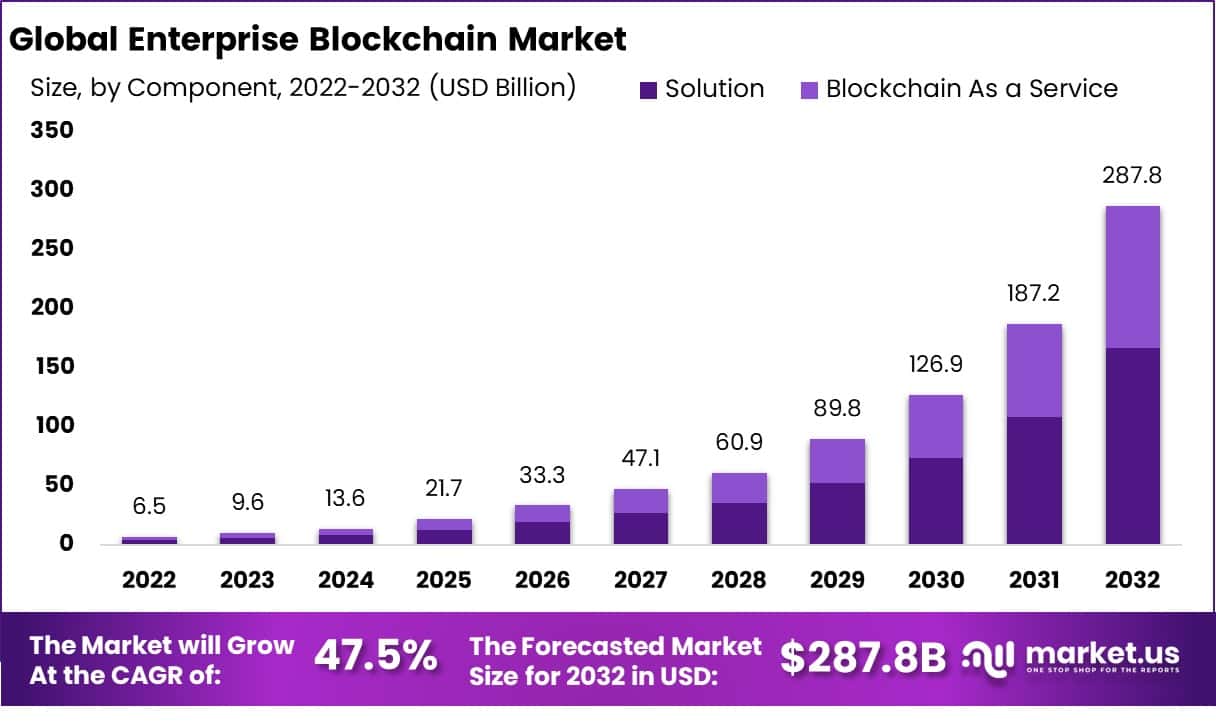
Key Growth Trends:
- Nearly 58% of enterprise blockchain use cases focus on data protection and security, as businesses look for secure, permissioned networks to handle sensitive information.
- The financial services sector leads with over 41% of the revenue share, primarily focusing on payment processing, transaction security, and smart contracts.
- Nearly 46% of supply chain companies in North America have implemented or are adopting blockchain to enhance operational visibility and efficiency.
- Blockchain in healthcare is expected to save the industry up to $100 billion annually by reducing fraud and enhancing operational efficiency.
- Blockchain-based health insurance applications could reduce fraudulent claims by 75%, saving $25 billion each year.
Enterprise blockchain is becoming a mainstream strategy, with 70% of global companies expected to adopt these technologies by 2026. Large organizations in industries like supply chain, finance, and healthcare are using blockchain for real-time tracking, secure data sharing, and streamlined operations, improving transparency and efficiency.
7 Powerful Ways Enterprise Blockchain Is Transforming Business Operations
From data integrity to asset tokenization, enterprise blockchain is changing business models, creating new efficiencies, and building trust. Here are seven strong ways that blockchain is transforming enterprise business operations:
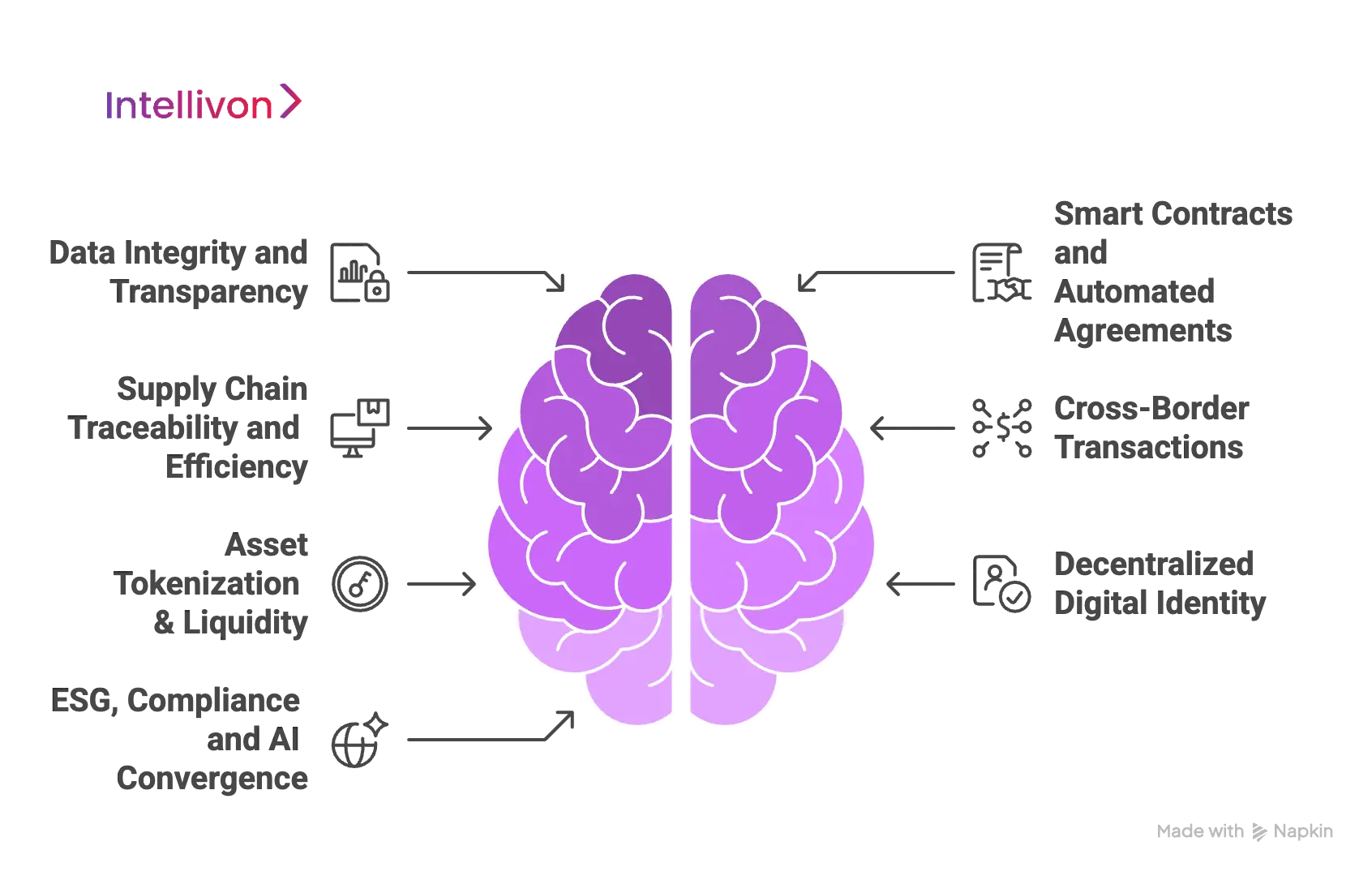
1. Data Integrity and Transparency
Blockchain guarantees data integrity by providing an immutable ledger of all transactions. Every record is time-stamped and securely stored, making it nearly impossible to alter or manipulate.
This transparency fosters trust both within organizations and across the wider industry. Enterprises can now rely on blockchain to conduct real-time audits, ensuring that every transaction is traceable and verifiable. This leads to better decision-making, reduced risk, and increased accountability.
Example: Walmart uses blockchain to trace product origins in its supply chain, significantly improving food safety and transparency. With blockchain, Walmart reduced the time to trace mangoes from 7 days to just 2.2 seconds.
2. Smart Contracts & Automated Agreements
Smart contracts are self-executing contracts where the terms of the agreement are directly written into code. These contracts automatically execute once predefined conditions are met, eliminating the need for intermediaries and reducing the potential for human error. In industries ranging from procurement to legal contracting to insurance, blockchain-powered smart contracts streamline multi-party workflows, making transactions faster, more efficient, and more reliable.
Example: IBM and Maersk use blockchain and smart contracts through their TradeLens platform to automate and streamline global shipping, eliminating paperwork and reducing errors in the logistics process.
3. Supply Chain Traceability & Efficiency
Blockchain drives end-to-end supply chain transparency and efficiency, offering real-time tracking from raw materials to final delivery. This enhanced traceability ensures compliance with industry standards, reduces fraud, and accelerates processes such as product recalls.
Industries like food, pharmaceuticals, and luxury goods benefit from blockchain’s ability to improve accuracy, reduce operational disruptions, and boost consumer confidence by ensuring the authenticity and safety of products.
Example: De Beers uses blockchain to track diamonds from extraction to sale, ensuring ethical sourcing and enhancing supply chain transparency with their Tracr platform.
4. Cross-Border Transactions
Cross-border transactions have long been plagued by high costs and delays due to the involvement of multiple intermediaries. Blockchain-based systems simplify and expedite cross-border payments, making them faster, cheaper, and more secure.
By eliminating the need for banks and clearinghouses, blockchain streamlines global finance, logistics, and trade, providing enterprises with faster financial settlements and reducing transaction fees.
Example: Santander uses RippleNet to enable faster and more secure cross-border payments, reducing transaction times and costs for their global clients.
5. Asset Tokenization & Liquidity
With asset tokenization, businesses can digitize real-world assets, such as real estate, commodities, and intellectual property. This process allows enterprises to fractionalize these assets, making them easier to trade and more accessible to a broader range of investors.
Tokenization also enhances liquidity by enabling more efficient and transparent transactions. This opens up new investment opportunities and offers innovative ways for businesses to manage their assets.
Example: RealT uses blockchain to tokenize real estate properties, allowing fractional ownership and providing new liquidity options for investors in real estate.
6. Decentralized Digital Identity
Blockchain supports the creation of secure, decentralized digital identities, which can streamline customer onboarding, enhance access management, and reduce fraud. By allowing individuals to control their personal data, businesses can verify identities quickly and securely.
This is especially beneficial in industries like banking, healthcare, and government services, where data privacy and security are top priorities. Decentralized identities provide greater control and reduce the risk of identity theft or unauthorized access.
Example: Microsoft has developed a decentralized identity system powered by blockchain, enabling users to control their data securely and reduce fraud in sectors like banking and healthcare.
7. ESG, Compliance, and AI Convergence
Blockchain’s immutable records support tracking for Environmental, Social, and Governance (ESG) metrics, ensuring organizations can prove their compliance with regulatory requirements.
The integration of blockchain with AI further enhances this by automating risk analysis, improving operational security, and streamlining governance processes. Together, blockchain and AI position enterprises to meet evolving regulatory standards, reducing compliance risks and enabling organizations to build more sustainable and socially responsible operations.
Example: BP uses blockchain combined with AI to track and verify carbon emissions data across its operations, ensuring compliance with sustainability regulations and improving environmental performance.
From improving data transparency to streamlining financial settlements, blockchain is opening new opportunities for businesses in different industries. Embracing blockchain is essential for companies seeking long-term growth and competitiveness.
Blockchain Integration with Other Tech for Enterprise Ops
Blockchain technology is most powerful when combined with other important technologies like cloud computing, IoT, and AI/ML. Here’s how blockchain works alongside these technologies to improve enterprise business operations:
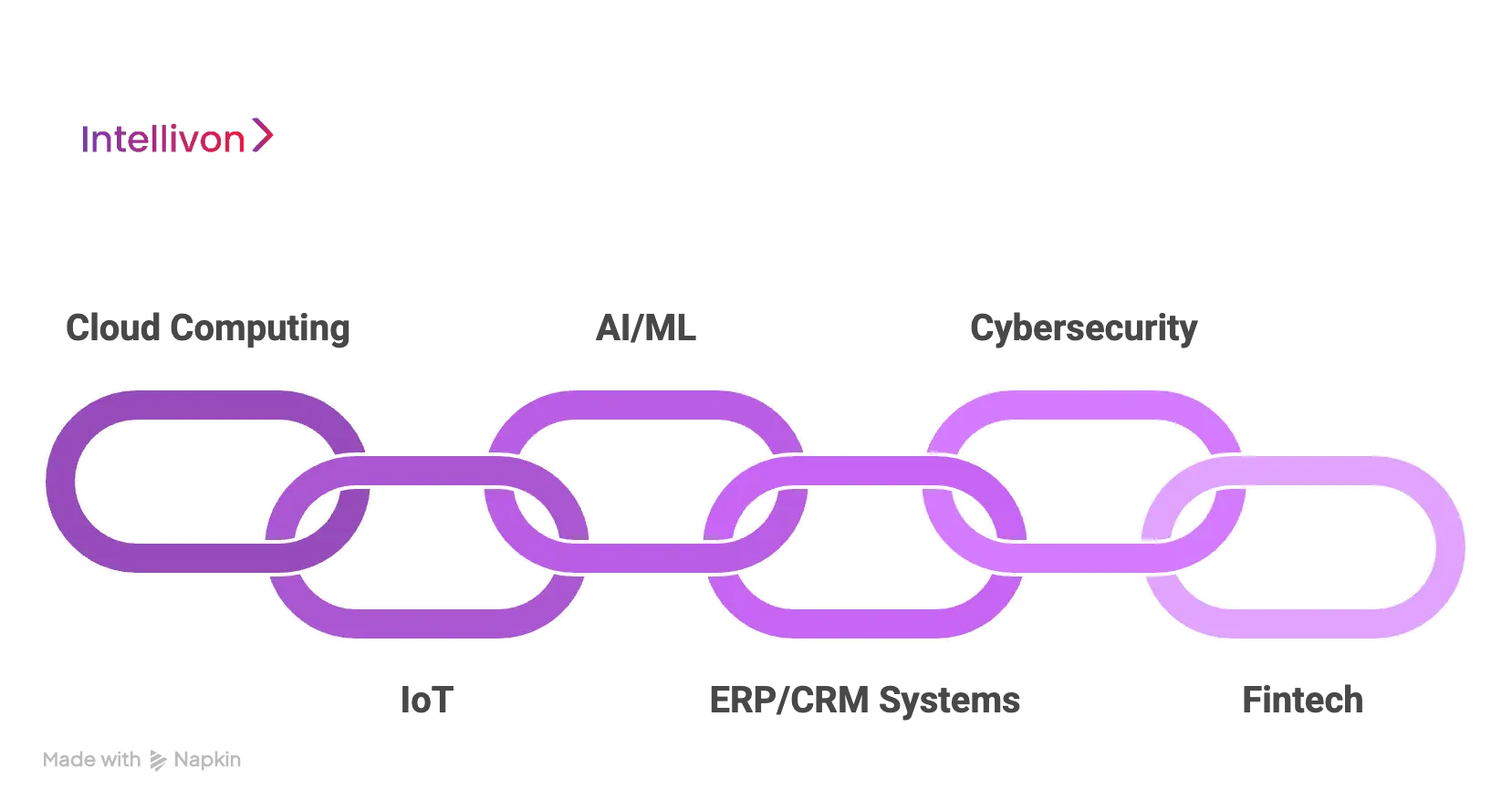
1. Blockchain and Cloud Computing
Cloud computing offers enterprises the ability to scale their operations quickly and store vast amounts of data without the need for costly infrastructure. When paired with blockchain, cloud systems benefit from blockchain’s distributed ledger technology, which ensures data integrity and security while maintaining scalability.
This combination allows businesses to securely store and manage large volumes of data across multiple locations, without compromising performance or security.
Example: Companies like Google Cloud are integrating blockchain to enhance the security of cloud storage, allowing for tamper-proof record-keeping and improved transparency.
2. Blockchain and IoT
The Internet of Things (IoT) connects devices and systems across industries, enabling real-time data exchange. However, the sheer volume of data flowing between devices creates significant security challenges. Blockchain can help by providing a secure, decentralized way for devices to interact. Blockchain ensures that data shared between devices is both immutable and traceable, mitigating the risk of cyberattacks and data tampering in connected networks.
Example: Cisco uses blockchain in its IoT solutions to enhance the security and transparency of device-to-device transactions, ensuring that devices in smart grids and healthcare systems interact securely and reliably.
3. Blockchain and AI/ML
When paired with AI and Machine Learning (ML), blockchain enhances the predictive capabilities of these technologies. AI and ML rely on vast amounts of data to make real-time predictions, while blockchain ensures the data used is accurate, secure, and transparent.
With blockchain in place, AI and ML can analyze this verified data to generate more accurate insights, automate processes, and improve decision-making.
Example: IBM Watson combines AI with blockchain to offer predictive analytics in healthcare, allowing for secure patient data management and better decision-making regarding treatments.
4. Blockchain and ERP/CRM Systems
Enterprise Resource Planning (ERP) and Customer Relationship Management (CRM) systems help organizations manage internal resources and customer interactions. By integrating blockchain into these systems, businesses can enhance trust and security in their transactions.
Blockchain allows for secure data sharing, real-time updates, and auditability, giving organizations more control over customer data and resource management while improving accuracy and transparency.
Example: SAP has integrated blockchain into its ERP systems, enhancing supply chain transparency and enabling more reliable customer data tracking in real-time.
5. Blockchain and Cybersecurity
Cybersecurity is one of the most pressing concerns for enterprises today. Blockchain plays a crucial role by providing an additional layer of security for sensitive business data. Blockchain’s cryptographic encryption and decentralized structure make it resistant to hacking, fraud, and unauthorized access. This ensures that transactions and sensitive data shared across networks remain protected from cyber threats.
Example: Chubb uses blockchain to enhance cybersecurity in insurance transactions, ensuring that sensitive customer data and insurance records are protected against breaches.
6. Blockchain and Fintech
Blockchain is transforming fintech and payment systems by providing faster, fraud-resistant transactions. Traditional payment systems rely on intermediaries, which can slow down transactions and increase costs.
Blockchain removes these intermediaries, allowing for peer-to-peer payments that are faster, cheaper, and more secure. This revolutionizes the way financial institutions and businesses handle transactions, particularly for cross-border payments.
Example: Ripple has developed blockchain-based solutions that allow instant cross-border payments, reducing costs and enhancing security for financial institutions like Santander.
The future of enterprise operations is in the convergence of these technologies, and blockchain is playing a central role in driving that transformation.
Key Features of a Scalable Enterprise Blockchain Solution
For businesses that want to use blockchain technology, scalability is essential. A blockchain solution must be strong, adaptable, and able to meet the increasing needs of large organizations. Here are the main features that make an enterprise blockchain solution scalable, ensuring lasting success and efficiency in business operations.
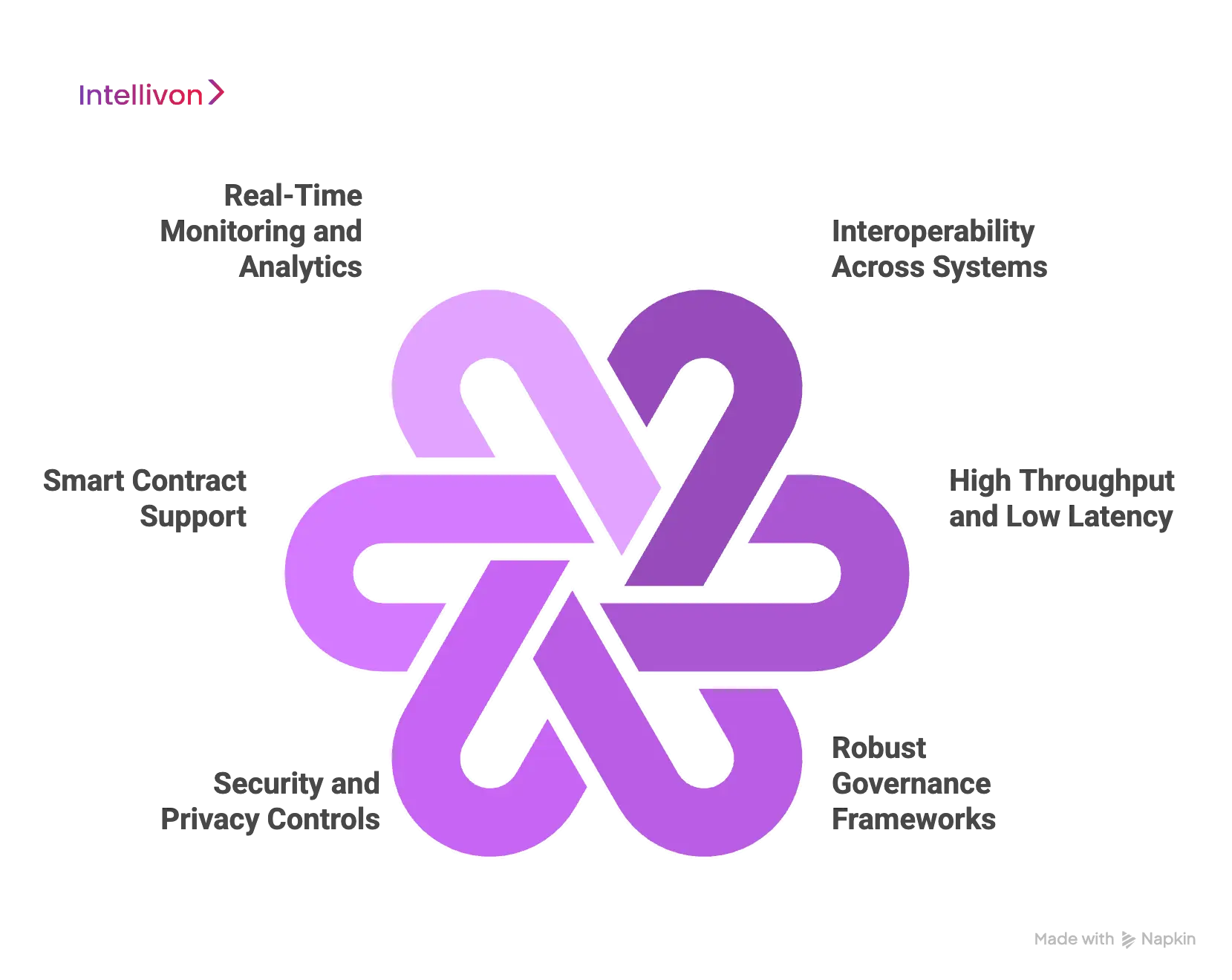
1. Interoperability Across Systems
A scalable blockchain solution must be able to integrate seamlessly with existing enterprise systems, including ERP, CRM, and legacy software. Interoperability ensures that blockchain can communicate with various platforms, data sources, and business processes without disruption. This feature enables enterprises to enhance their current operations rather than overhaul them entirely.
Example: IBM’s Hyperledger Fabric allows businesses to integrate blockchain into existing IT systems, making it easier to deploy blockchain while maintaining compatibility with legacy enterprise software.
2. High Throughput and Low Latency
Blockchain solutions for large enterprises need to handle a high volume of transactions without compromising speed. Throughput refers to the system’s ability to process many transactions in a given time, while latency refers to the time it takes to execute each transaction. A scalable blockchain solution must be capable of processing transactions quickly and efficiently, even as the number of users and transactions grows.
Example: Visa’s B2B Connect uses blockchain technology to process large volumes of cross-border payments in near real-time, ensuring both high throughput and low latency in financial transactions.
3. Robust Governance Frameworks
Enterprises operate in highly regulated environments, and blockchain solutions must adhere to governance and compliance requirements. Scalable blockchain solutions should offer strong mechanisms for auditing, data integrity, and regulatory compliance.
This ensures that every transaction recorded on the blockchain is secure, traceable, and compliant with industry standards.
Example: Microsoft Azure Blockchain provides governance tools that enable enterprises to enforce compliance with local and global regulatory standards, enhancing accountability and minimizing risks.
4. Security and Privacy Controls
Security is paramount for any enterprise blockchain solution. A scalable solution must feature robust cryptographic encryption, multi-signature authorization, and privacy controls to protect sensitive data. Enterprises need to ensure that only authorized participants can access specific data and that transactions are fully encrypted to prevent unauthorized tampering or fraud.
Example: Chainalysis offers enterprise-grade security solutions, providing encryption and tracking tools that ensure the privacy and security of blockchain transactions in regulated industries like finance and healthcare.
5. Smart Contract Support
A robust blockchain solution must support the creation, execution, and management of smart contracts that automatically trigger actions when predefined conditions are met. This feature significantly reduces human error, speeds up workflows, and ensures consistency in business transactions.
Example: Ethereum is a popular blockchain platform that supports smart contracts, widely adopted by enterprises for automating various processes, such as procurement, payments, and supply chain management.
6. Real-Time Monitoring and Analytics
For blockchain to be truly valuable to enterprises, it must offer real-time monitoring and analytics capabilities. This feature enables businesses to track blockchain performance, identify potential issues, and gain actionable insights from blockchain data. Real-time visibility ensures that enterprises can make informed decisions and respond quickly to operational challenges.
Example: Oracle Blockchain Platform offers real-time monitoring tools that enable enterprises to track performance, detect fraud, and gain insights into blockchain activity, enhancing decision-making and improving efficiency.
With the right blockchain infrastructure in place, enterprises can unlock greater efficiency, transparency, and security, driving innovation and gaining a competitive edge in their industry.
Intellivon’s Blockchain Toolkit for Scalable Business Ops
Our toolkit uses a mix of modern tools to automate processes, improve efficiency, and address challenges like fraud detection, supply chain risks, and compliance. Here’s an overview of the tools and how they improve scalable business operations:
1. Smart Contract Validation Tools
Smart contracts are a cornerstone of blockchain technology, automating agreements and workflows. To ensure that smart contracts are secure and free from vulnerabilities, we integrate the following smart contract validation tools into our blockchain solutions:
- Slither: A static analysis tool for Solidity smart contracts, detecting vulnerabilities and optimization opportunities.
- Mythril: Uses symbolic execution to uncover vulnerabilities in Ethereum smart contracts.
- Echidna: A fuzz testing tool that generates inputs to dynamically detect contract anomalies.
- Diligence Fuzzing: Automated fuzzing by ConsenSys to identify hard-to-detect bugs.
- Hardhat and Truffle: Development frameworks that include testing and deployment capabilities.
- Securify: Automated compliance and vulnerability analysis for Solidity contracts.
These tools perform static and dynamic analysis, formal verification, and fuzz testing, ensuring that smart contracts are secure, robust, and free from critical vulnerabilities.
2. AI-Powered Fraud Detection
Fraud prevention is a top concern for enterprises, particularly when it comes to sensitive transactions. Our AI-powered fraud detection tools leverage blockchain’s transparency and the predictive capabilities of AI to protect enterprises from fraudulent activities. Some of the tools we integrate into our blockchain solutions include:
- Cognitivescale: AI-driven fraud prevention leveraging blockchain-validated data.
- Fraugster: AI fraud detection integrated with blockchain payment data.
- Featurespace: Real-time fraud detection using machine learning analytics on blockchain transaction behavior.
By combining AI with blockchain, these tools enable real-time monitoring and identification of fraudulent activity, minimizing risks and ensuring secure transactions.
3. Predictive Supply Chain Risk Intelligence
Supply chain disruptions can severely impact business operations, but with predictive supply chain risk intelligence, enterprises can mitigate potential risks before they escalate. Our blockchain solutions integrate the following tools to provide AI-driven insights into supply chain management:
- Resilinc: Predicts supply chain risks using blockchain provenance data.
- SupplyShift: Combines blockchain traceability with AI analytics to flag risks and inefficiencies.
- Llamasoft (Coupa): AI-driven supply chain insights, leveraging blockchain to provide transparency.
These tools enable businesses to proactively identify disruptions, optimize supply chain operations, and reduce inefficiencies, ensuring smoother and more resilient business processes.
4. ESG Tracking Dashboards
With increasing emphasis on Environmental, Social, and Governance (ESG) compliance, blockchain can enhance transparency and tracking of sustainability efforts. Our blockchain solution incorporates the following tools to provide real-time ESG tracking and reporting:
- Everledger: Tracks provenance and sustainability of goods on the blockchain.
- IBM Environmental Intelligence Suite: Blockchain-enabled ESG data integration and analytics.
- UL Visible Supply Chain: Combines IoT, blockchain, and AI to provide transparent sustainability dashboards.
These tools allow enterprises to track their sustainability efforts, ensuring that they meet regulatory requirements and communicate their ESG progress to stakeholders with confidence.
5. Custom Integration with ERP/CRM
For large enterprises, seamless integration with existing ERP and CRM systems is crucial. Intellivon’s blockchain solution offers custom integration capabilities using these industry-leading middleware and integration tools:
- MuleSoft Anypoint Platform: Connects blockchain networks with ERP, CRM, and legacy systems.
- IBM Blockchain Platform: Provides APIs and tools to integrate blockchain with existing IT infrastructure.
- Microsoft Azure Blockchain Service: Facilitates the integration of blockchain with Microsoft enterprise applications.
These tools enable blockchain to seamlessly fit into your current IT ecosystem, enhancing data flow, automating processes, and improving operational efficiency.
6. Scalable Infrastructure
As enterprises expand, their blockchain solutions must be capable of handling increasing transaction volumes and data. Intellivon’s toolkit is built for scalability, offering high-throughput capabilities to ensure that your blockchain solution grows with your business. Our toolkit supports enterprises with modular, flexible blockchain infrastructure to scale seamlessly without compromising performance.
7. End-to-End Security and Data Privacy
Security is a top priority for enterprises, especially when handling sensitive data. Intellivon’s blockchain toolkit ensures end-to-end security by offering robust cryptographic encryption and multi-layered data privacy controls.
We use industry-leading security tools to protect your enterprise from unauthorized access, ensuring the highest levels of data protection and compliance.
With the right tools and support, enterprises can unlock new opportunities, streamline processes, and drive innovation, ensuring long-term success and growth.
Our Process for Building Enterprise Blockchain Solutions
At Intellivon, we use a clear process to provide blockchain solutions that meet the unique needs of your business. Our method guarantees that your blockchain solution is secure, scalable, and works well with your current systems. Here is an overview of each step in our process.
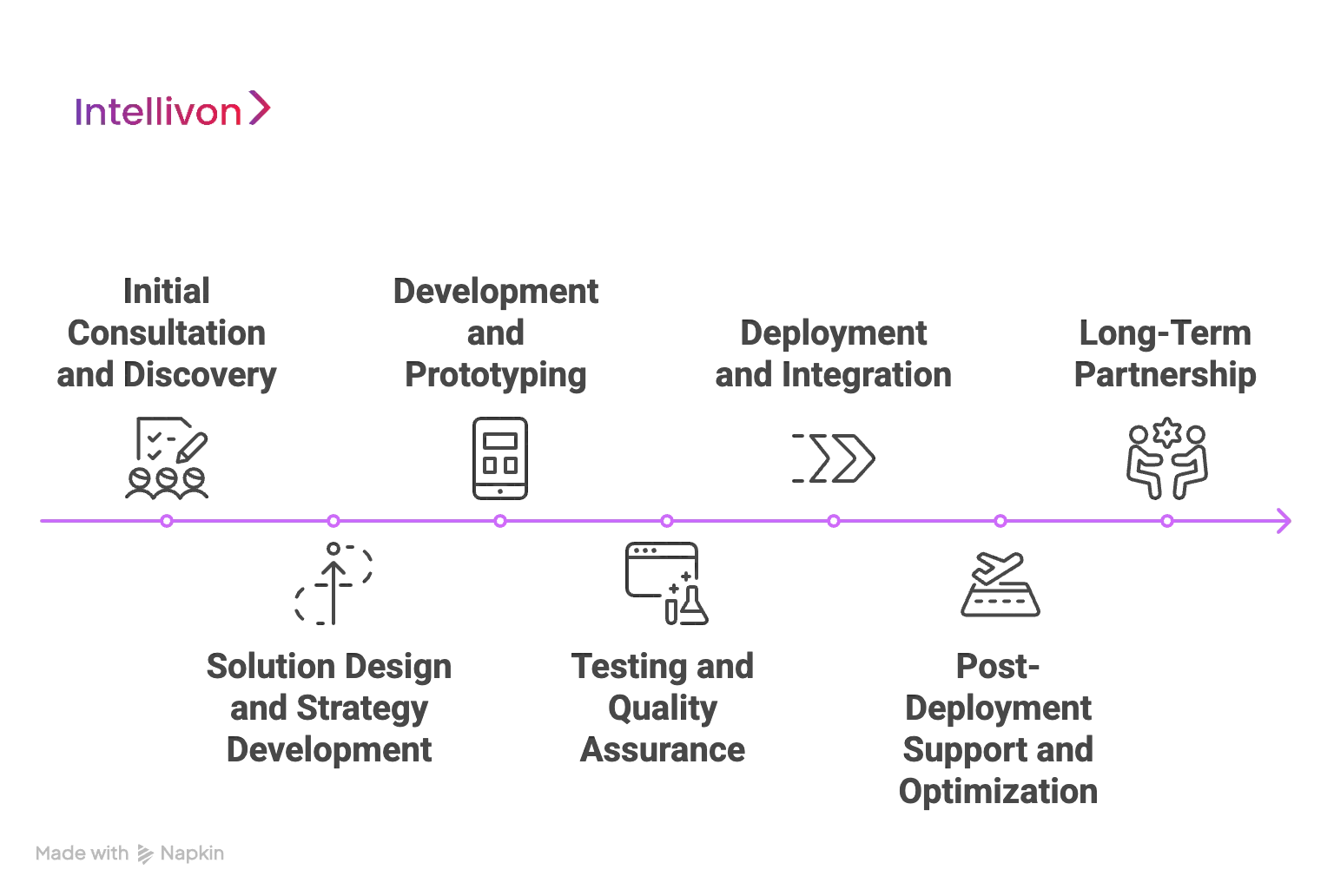
Step 1: Initial Consultation and Discovery
The process begins with an in-depth consultation where we take the time to understand your business’s unique challenges and objectives. This stage involves detailed discussions with your team to pinpoint pain points and determine how blockchain can address them. By defining clear goals from the start, we ensure the solution is perfectly aligned with your strategic vision, whether it’s enhancing operational efficiency, boosting data security, or enabling real-time tracking.
Step 2: Solution Design and Strategy Development
With a solid understanding of your needs, we move to the design phase, where we create a tailored blockchain solution. This includes selecting the appropriate consensus mechanism, blockchain type (permissioned or permissionless), and integrating smart contract functionalities to meet your specific business requirements. We also choose the best blockchain platform (such as R3 Corda, Hyperledger Fabric, or Ethereum) based on scalability and compatibility with your existing systems. To confirm feasibility, we may develop a Proof of Concept (PoC) to validate the solution before proceeding with full-scale development.
Step 3: Development and Prototyping
This phase is where the actual development of your blockchain solution begins. We focus on building and testing smart contracts that automate key processes and enforce the necessary business rules. Simultaneously, we integrate the blockchain with your existing systems, like ERP or CRM. Using agile development methods, we ensure the solution is flexible and adaptable to evolving business needs. Through prototyping, we test and iterate on the initial version of the solution, incorporating real-world feedback to refine the product.
Step 4: Testing and Quality Assurance
Before launching, we conduct thorough testing to ensure that the blockchain solution meets performance expectations. This includes security audits to identify vulnerabilities, as well as user acceptance testing (UAT) to ensure the system meets your business requirements. We also focus on optimizing performance to handle high transaction volumes and ensure scalability, guaranteeing that the solution operates smoothly under load.
Step 5: Deployment and Integration
Once the solution passes all testing phases, we move to the deployment stage. Our goal is to ensure a seamless implementation with minimal disruption to your daily operations. We also assist with data migration from legacy systems to the new blockchain solution, ensuring a smooth transition with no data loss or downtime. Our integration process ensures the blockchain solution fits perfectly into your existing IT infrastructure.
Step 6: Post-Deployment Support and Optimization
Blockchain technology evolves, as do your business needs. After deployment, we continue to provide ongoing support to monitor system performance, address any issues, and maintain security. We also assist with scalability adjustments, ensuring the system can handle increasing data and transaction volumes. Our support ensures your blockchain solution operates efficiently over time and adapts to your business’s growth.
Step 7: Long-Term Partnership
At Intellivon, we don’t view our relationship with clients as a one-time engagement. We believe in continuous collaboration to ensure your blockchain solution evolves alongside your business. We support future upgrades, explore new features, and incorporate industry innovations to maintain the system’s relevance and value in the years ahead. This ongoing partnership ensures that your blockchain solution remains aligned with your long-term goals and continues to drive success.
If you’re ready to unlock the transformative potential of blockchain for your business, contact our experts today. We’ll guide you through each step, providing a customized solution tailored to your unique needs.
Best Practices We Follow for Enterprise Blockchain Adoption
We follow trusted practices to make sure that blockchain integration is smooth, efficient, and fits our clients’ long-term business goals. By sticking to these practices, we help businesses successfully go through the blockchain adoption process. This approach reduces risk and increases value.
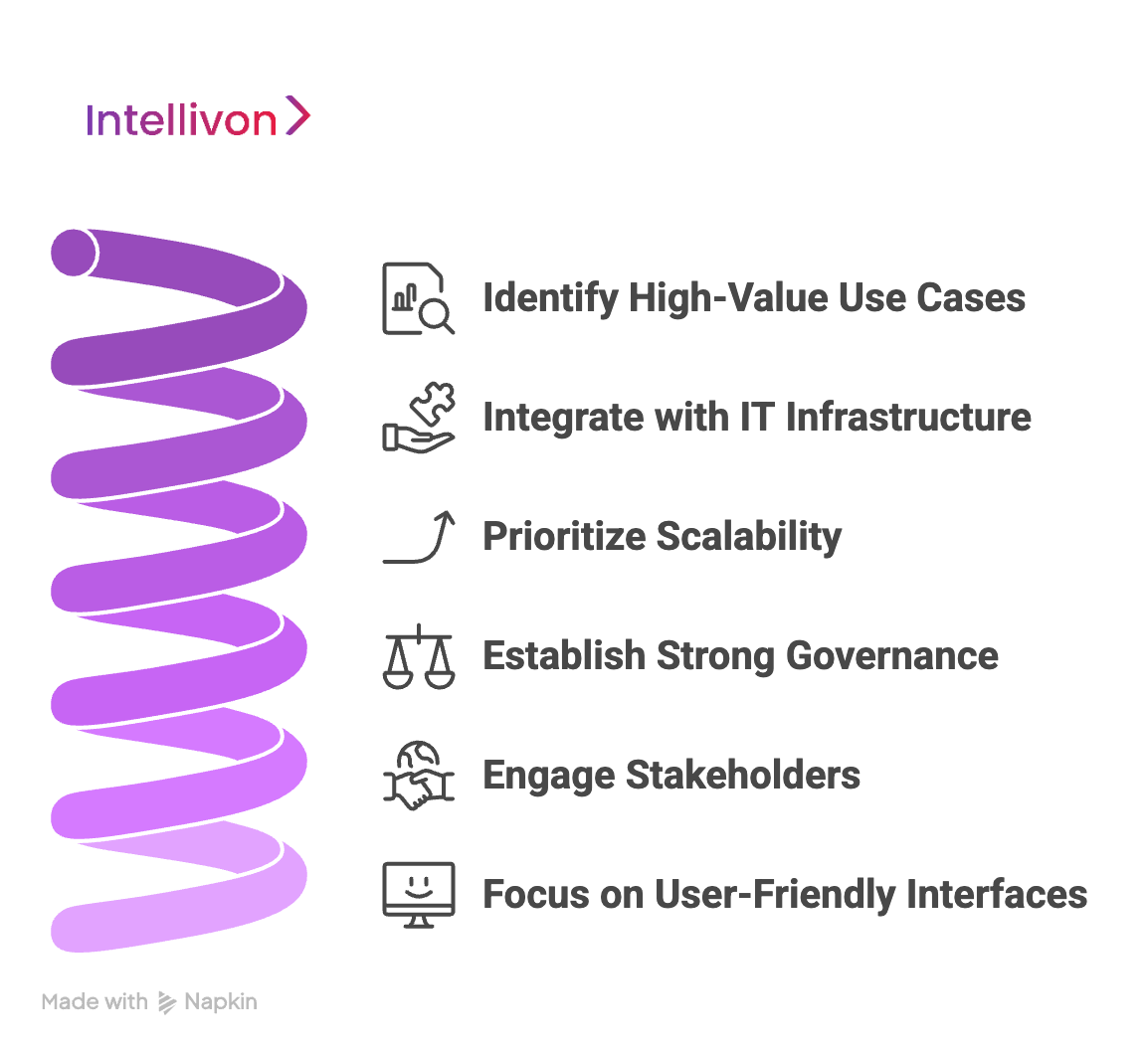
1. Identify High-Value Use Cases
We begin the blockchain adoption process by identifying high-value, low-risk use cases that can deliver immediate benefits. By focusing on specific challenges, such as supply chain transparency, fraud detection, or automating payments, we help businesses see quick returns while gaining hands-on experience with blockchain. This approach reduces initial risk and helps build confidence across the organization.
2. Integrate with IT Infrastructure
We know that integrating blockchain into your existing systems is crucial for success. That’s why we ensure that our blockchain solutions are designed to align seamlessly with your ERP, CRM, and other enterprise applications.
We focus on custom integrations to ensure that your current systems continue to work efficiently alongside the new blockchain solution, reducing disruption and optimizing operations.
3. Prioritize Scalability
A scalable blockchain solution is key to future growth. We design blockchain systems that are not only capable of handling current transaction volumes but also adaptable to future expansion.
By prioritizing interoperability, we ensure that our solutions can work with other blockchain networks, legacy systems, and new technologies as your business grows.
4. Establish Strong Governance
At Intellivon, we understand the importance of regulatory compliance and governance in blockchain adoption.
That’s why we work closely with our clients to establish clear governance models, ensuring that all transactions and data are secure, auditable, and compliant with industry standards.
Our blockchain solutions include automated compliance checks, ensuring ongoing adherence to evolving regulations.
5. Engage Stakeholders
We believe that successful blockchain adoption begins with full stakeholder engagement. From day one, we work closely with executive teams, IT professionals, and operational staff to ensure alignment on goals, expectations, and benefits.
By involving all relevant stakeholders early in the process, we reduce resistance and create a shared vision for the blockchain solution.
6. Focus on User-Friendly Interfaces
To drive adoption, we focus on building intuitive user interfaces that simplify blockchain interaction for all team members, regardless of their technical expertise.
Additionally, we provide comprehensive training to ensure that employees are fully equipped to use the blockchain solution effectively. This combination of user-friendly design and training ensures smoother adoption and higher success rates.
Whether you’re starting small with a specific use case or scaling a global blockchain network, our proven strategies help you build a sustainable, future-ready solution that drives growth and innovation.
Future Trends in Enterprise Blockchain
As blockchain technology continues to evolve, new trends are emerging that will reshape the way businesses operate. Enterprises are looking for more advanced and adaptable blockchain solutions to meet their growing demands and ever-changing business environments. Here are some of the key future trends in enterprise blockchain technology:
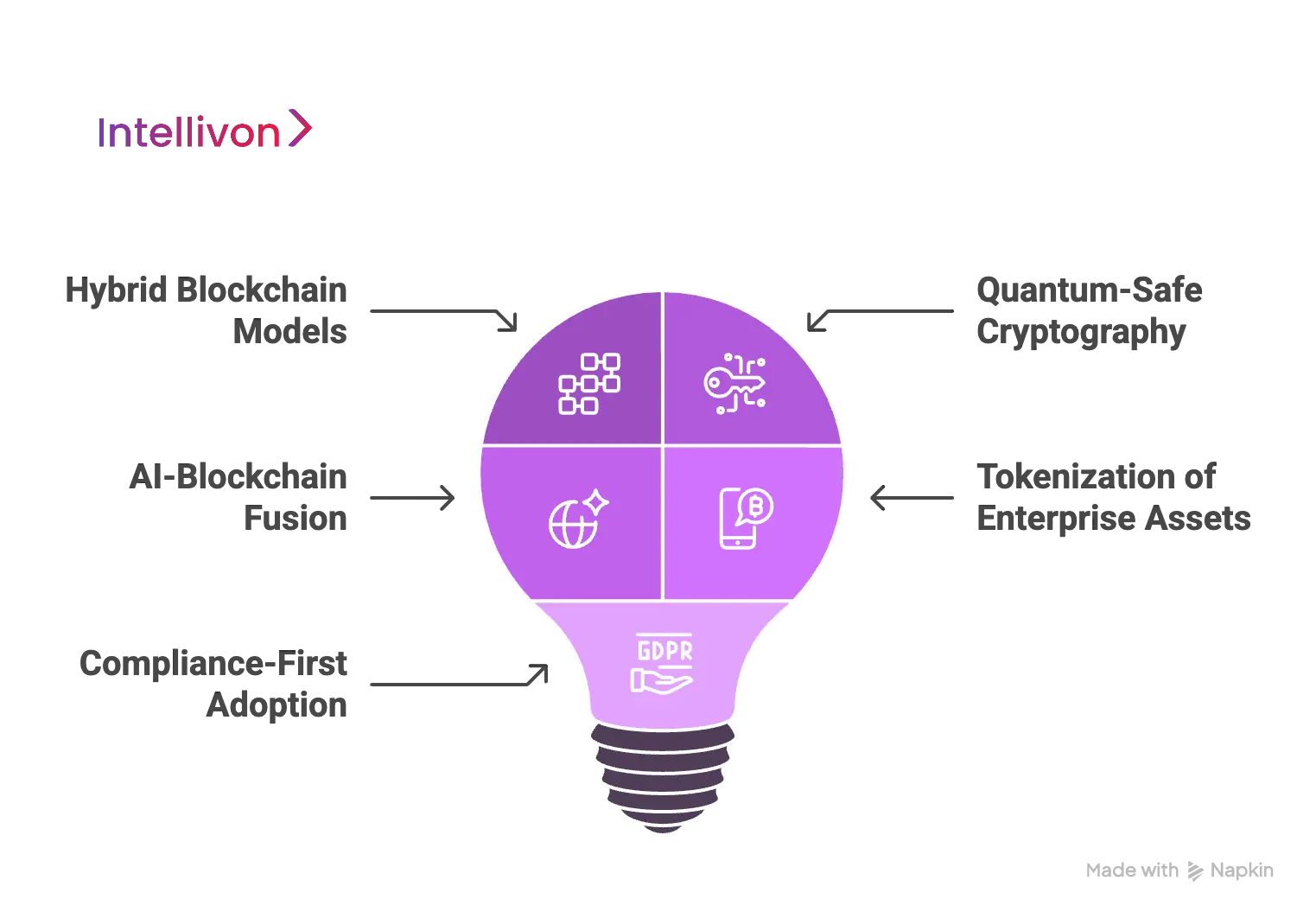
1. Rise of Hybrid Blockchain Models
While public and private blockchains have been widely adopted, the rise of hybrid blockchain models is expected to dominate in the coming years.
A hybrid model combines the best aspects of both public and private blockchains, providing businesses with the flexibility of private systems for sensitive transactions, alongside the transparency and security of public blockchains.
This model allows enterprises to leverage blockchain’s full potential without compromising on privacy or scalability.
2. Integration with Quantum-Safe Cryptography
As quantum computing advances, traditional cryptographic systems may become vulnerable to attacks. Quantum-safe cryptography is a growing trend that ensures blockchain systems remain secure in a post-quantum world.
By integrating quantum-resistant algorithms, blockchain can withstand potential threats posed by quantum computers, making it a long-term solution for securing enterprise data.
3. AI-Blockchain Fusion
The fusion of AI and blockchain is transforming the way enterprises handle data and automation. AI-powered blockchain systems can optimize business operations by predicting trends, automating decision-making, and streamlining workflows in real-time.
This AI-blockchain synergy enables enterprises to create autonomous operations, where systems can self-monitor, self-optimize, and adapt to changes in the business environment without human intervention.
4. Tokenization of Enterprise Assets
Tokenization refers to the process of converting real-world assets, such as real estate, commodities, and intellectual property, into digital tokens on a blockchain.
This allows businesses to fractionalize ownership, making it easier to trade and invest in previously illiquid assets. Additionally, enterprises can tokenize contracts and agreements, improving efficiency, security, and traceability in business transactions.
5. Compliance-First Adoption
As blockchain adoption accelerates, regulatory frameworks are evolving to ensure compliance with laws governing data privacy, financial transactions, and industry-specific regulations. Enterprises are increasingly adopting blockchain solutions with a compliance-first strategy, integrating automated compliance checks and audit trails into their blockchain systems.
This trend will drive the widespread adoption of blockchain in heavily regulated industries such as finance, healthcare, and energy.
As blockchain technology continues to evolve, enterprises that stay ahead of these trends will be better equipped to scale, innovate, and remain competitive in an increasingly digital world.
Conclusion
Blockchain is changing how businesses operate by increasing efficiency, security, and transparency. It automates processes with smart contracts and improves supply chain management and data security. Its potential is vast.
As companies adopt blockchain technology, keeping up with new trends and using best practices will be crucial for creating long-term value and ensuring successful, scalable solutions for the future.
Build Your Next Blockchain-Powered Enterprise Solution With Us
Developing a blockchain solution for your enterprise is about creating a secure, scalable, and efficient system that drives innovation and supports long-term growth. With our expertise in blockchain technology and a proven track record of successful enterprise implementations, we are the trusted partner for building customized blockchain solutions that deliver tangible business value.
Why Choose Us for Blockchain Solutions?
- Tailored Blockchain Architecture: Custom-designed to meet your business objectives and industry-specific needs.
- Seamless Integration: Smooth integration with your existing ERP, CRM, and legacy systems.
- Enterprise-Grade Security: Solutions built with top-tier security standards to protect your data and ensure compliance.
- Scalability for Growth: Blockchain solutions that grow with your business, supporting high transaction volumes and data complexity.
- Continuous Support & Training: Comprehensive training for your team and ongoing support to ensure smooth operation.
Our blockchain experts are ready to help you:
- Define your blockchain strategy and objectives.
- Design a tailored blockchain solution for your enterprise.
- Ensure compliance with industry regulations.
- Develop, test, and deploy your blockchain system with continuous monitoring and support.
Book a free consultation to discuss how blockchain can revolutionize your business. Let’s build the secure, scalable, and future-ready blockchain solution your enterprise needs.
FAQ’s
Q1. What is enterprise blockchain, and how does it benefit businesses?
A1. Enterprise blockchain is a distributed ledger technology that allows businesses to securely share and verify data across a network. It enhances transparency, improves security, automates processes with smart contracts, and increases operational efficiency by reducing intermediaries and fraud.
Q2. How can blockchain improve supply chain management in enterprises?
A2. Blockchain provides end-to-end transparency in the supply chain, allowing businesses to track products in real-time, reduce fraud, and enhance traceability. It also automates processes like payments and documentation, improving efficiency and reducing delays in global supply chains.
Q3. What are smart contracts, and how do they help businesses?
A3. Smart contracts are self-executing agreements where the contract terms are directly written into code. They automatically execute when conditions are met, reducing the need for intermediaries, speeding up transactions, and ensuring consistent enforcement of terms in various business functions like procurement and insurance.
Q4. How does blockchain enhance data security for enterprises?
A4. Blockchain uses advanced cryptographic techniques to ensure data integrity and security. Its immutable ledger prevents unauthorized changes to records, while decentralized storage reduces the risk of data breaches, making blockchain a powerful solution for safeguarding sensitive business information.
Q5. What trends are shaping the future of enterprise blockchain?
A5. Key trends include the rise of hybrid blockchain models, quantum-safe cryptography, the fusion of AI and blockchain for autonomous operations, tokenization of assets, and regulation-driven adoption. These innovations will further optimize efficiency, security, and scalability for enterprises leveraging blockchain technology.

